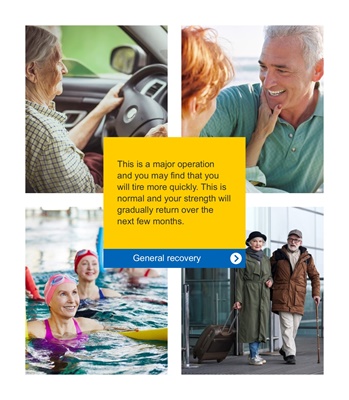
This is a major operation and you may find that you will tire more quickly. This is normal and your strength will gradually return over the next few months.
General Recovery Information
Return to Normal Activities
This is a major operation and you may find that you will tire more quickly. This is normal and your strength will gradually return over the next few months. Ensure you are taking regular rest during the day especially in the early days after discharge home.
Return to Work
This depends on the nature of work you do. If you have a heavy manual / labour intensive job it will normally be a minimum of 6 weeks before you can return.
It is important that no matter what job you do, that you have given yourself sufficient time to heal to allow you to carry out your job safely.
If you have any queries or concerns, please discuss returning to work with your Consultant or Trauma and Orthopaedic Practitioner.
Return to Driving
Normally patients return to driving no sooner than six weeks following their operation.
Do not drive until you are fully confident that you are in complete control of your vehicle. Do not drive if you feel your judgement / reactions are impaired by pain, weakness or by your medications.
You must be able to safely perform an emergency stop before you can drive again.
It is also advisable to check the terms of your car insurance, as some policies may state that you must not drive for a specified period after the operation.
The decision to return to driving is made by yourself and is not decided by your Consultant or their team. However, they will be more than happy to give you advice.
If you have any queries or concerns, please discuss returning to driving with your Consultant or Trauma and Orthopaedic Practitioner.
Sexual Activity
In general, it is safe to resume intercourse approximately six weeks after surgery. This allows time for the wound and the muscles around your hip to heal.
Total hip replacement precautions need to be observed during all your activities of daily living, including sexual intercourse. You should avoid excessive bending, crossing your legs or turning your leg inwards.
Good communication between you and your partner is essential, because you may have to adopt new position(s) for intercourse.
If you require further information, please speak to your Occupational Therapist who can provide a leaflet with more information.
*Information and guidance kindly provided by www.aboutjoints.com
Sports and Hobbies
High impact sports which involve running on hard surfaces or jumping plus contact sports, have potential to place greater pressure on your new hip and cause early wear and loosening.
If playing golf, avoid full swing until 3 months following your surgery.
You can return to cycling, but care should be taken when getting on / off either a road or static bicycle. Also, be aware of the height of the saddle.
Swimming will help to improve your flexibility and muscle strength. It is safe to resume swimming once the wound is well healed. In the swimming pool you can carry-out –
Hip strengthening exercises - Carry-out hip abduction and extension strengthening exercises as previously described. Ensure you stand holding onto support at the side of the pool.
Front or back crawl is advised if possible. You may gradually re-introduce breaststroke after 3 months.
Consider risk factors such as slipping and access to the pool when going swimming.
Regular exercise will help to improve & maintain your mobility. When returning to any sport, it is important to take time to rebuild your strength, co-ordination & reflexes.
Gardening should be undertaken with care. Be careful not to bend and twist at the same time.
Bowls - always try to place the operated leg out behind you when kneeling down.
If you are unsure, please speak with your Physiotherapist, Consultant, Trauma and Orthopaedic Practitioner, Occupational Therapist or GP.
Travel Advice
Following your surgery, there is an increased risk of developing a blood clot (DVT or deep vein thrombosis).
If total travel time is less than 4 hours – travel is not recommended until after 6 weeks.
If total travel time is greater than 4 hours – travel is not recommended until after 3 months.
Care should be taken with steps into the plane and also of seat height on the plane.
It may be advisable to bring a cushion to sit on.